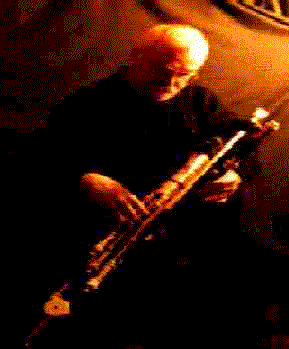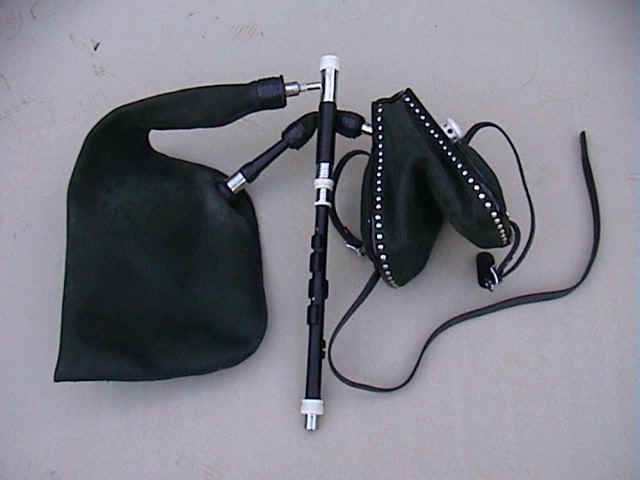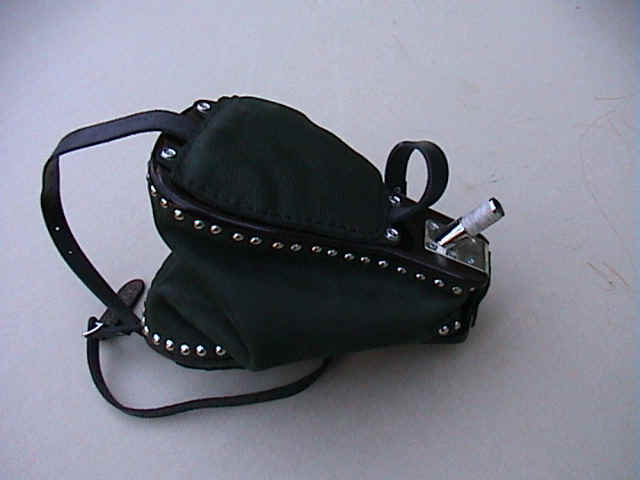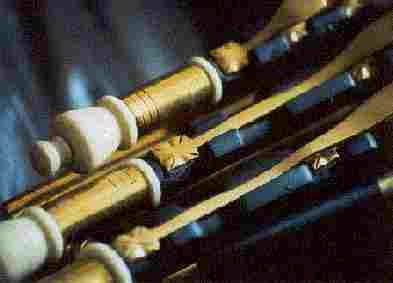
Dooley Pipes

Photo I used for Teach an Phiobaire Guest House sign
Tell Me what I need to know before you order. Have a quick read through the following points to help you decide, but don't be afraid to ask me about any specific item.
Options Ordering Delivery Guarantee
I do not make 'Practice Sets' as such, I make a Bag, Bellows, and Chanter (and all variations short of a Full Set) to the same standard and finish as those on a Full Set. This means that upgrading is straightforward and more economical. Sets are made in a variety of Pitches. I also use different materials, wood and metal, and offer some variation in 'style'. If you want to order, you need to tell me :
Type of Set you want -
Full Set, Three Quarter Set, Half Set, or Practice Set.
Pitch of the Set - from D, C#, C, B, or Bb
Wood and Metal required - Ebony, Boxwood, Brass, Nickel Silver, or others
Style variations - if any - and an idea of your size for straps and connector sizes
Pitched in D, C#, C, B, and Bb
D is the most common pitch and about 60% of my Sets are in D. Sometimes referred to as 'Concert Pitch', my D Chanters at 14.25" long are the shortest Chanter I make. Suitable for small hands (because of the finger span), those interested in playing with other traditional instruments (like fiddle, concertina, flute, etc.), and beginners (because most Tutors use D).
If you are not sure about pitch listen to some recordings. I suggest Jimmy O Brien Moran (mostly B) or Seamus Ennis (C#). Contact Na Piobairi Uilleann for a list of recordings and Pipers in various pitches.
VolumeD is the loudest pitch I make and the volume of Sets pitched lower than D tends to decrease as the pitch drops. I like my Sets to be audible but not to overwhelm other instruments in sessions, consequently my 'D' Sets may be a little quieter than average.
All my Sets are tuned to 'Just So' tuning. This means that all notes are biased to play in harmony with the drones. Testing with an electronic tuner does not accurately define the frequency of individual notes on my Chanters, as most tuners only measure the fundamental harmonic.
I commonly use Ebony, African Blackwood, and Boxwood. I use other exotic hardwoods by special order. Brass, Nickel Silver, and Sterling Silver are the most common metals I use. All wood takes a minimum of twelve months from start of work to completion. Even wood that I buy-in kiln dried to 12% moisture content will shrink when cut and exposed to normal indoor conditions. This means I must plan what I am making more than a year in advance which has two implications. First you must wait for specific Sets, secondly I may have what you want scheduled outside my normal waiting list (usually a bit more expensive).

When I work with Nickel Silver and Sterling Silver in particular, all ferrules and tubes are hand rolled and welded (as with Sets built more than 100 years ago). It also means that ferrules are tapered for appearance and grip. I charge an extra premium for such work.
The Imitation Ivory I use is a form of epoxy resin with a grain very similar to freshly turned and polished real Ivory. I prefer to keep the few small pieces of real Ivory I have for restoration and repair of old Sets which require this. I sometimes use boxwood for mounts - ask me about this if your are interested.
Leather is the same quality as the bag and recessed under the boards. Valve is multiple inlet to avoid clogging and straps are also recessed into the boards. I usually screw on pads for elbow and hip (leather with foam filler). Hinge is made from matching metal or possibly leather stitched to metal plates. Bellows are sealed with liquid latex. Air Outlet Tube is mounted on the hinge plate and the connector is detachable stitched leather.

Hand stitched calf-skin probably black, but I sometimes have burgundy or dark green or similar. All bags are large enough to comfortably drive a full Set. Necks can be made a little shorter for children or Pipers with short arms. Stocks are often made from black nylon as ebony is susceptible to cracking if knocked. Tell me if you have preferences.

I make keys in a variety of designs, both the head and tone-hole cover :
Head can be tear-drop (various widths), Waisted tear-drop like on old Flat Sets, or flat Taylor style.Hole covers can be Round Cup, Plain Flat Square, or Cross-cut Square. Picture shows tear-drop keys (12mm wide) with cross-cut square covers.
I usually turn 'D' Chanters with blocks for 5 keys shaped and slotted, tone-holes drilled and corked. You need to tell me early on about Chanter Key requirements. Chanters pitched in other keys can have up to seven or eight keys.
Every Set is custom made to suit your size, playing style, and preferences (in appearance features).
By and large you can select various 'style' options once I am satisfied about the acoustical impact (if any). I charge a premium for any option which requires additional labour or material costs.
Typical 'style' options would be for Chanter / Regulator Keys, a Chanter Head of metal or wood, the Air Inlet to Chanter Head through top or side, Sound Box on bass drone as Pill Box or as other drones, and fold back style on bass drone round or rail-track.
I am now asking for a booking deposit of £50 with all orders. I also look for payment in advance for any additional or non-standard options, for example specific keys on a Chanter or a short neck Bag. Such payment may not be returnable if you change your mind as I may not subsequently recover such costs if I offer the item 'Off the Shelf'.
I accept orders from many Countries around the world and most of my Sets are shipped outside Ireland. Send me an e-mail saying what you are looking for and I'll get back to you with details - timescale and approx price. I can only tell you the current price as sets made for delivery next year and later may be affected by inflation, cost of materials, etc.
I expect the outstanding balance to be paid when delivery is accepted. However, I prefer Customers to see, hear, and play Sets before accepting delivery. If you live in Ireland or will be visiting here, we should be able to arrange this easily. For Customers living outside Ireland, or who are not yet able to play, there are a number of options worth considering.
Have a Professional Player check the pipes out for you. You could expect to pay a fee between £30 and £50 for this service. Alternatively, you could ask a friend or relative who is (or knows) an experienced player to check the pipes. If you have concerns about this, talk to me, I'm sure we can work out something.
Remember to add on the cost of Post, Packing, and Insurance, to the purchase price. A Bag, Bellows, and Chanter, to east coast U.S.A. works out at about £40, and takes about eight working days. Outside Europe and the U.S.A. check if any import duty applies.
I cannot offer a guarantee as such but I will replace or repair (at any time) any defect which could be attributed to my design or workmanship.
The most common problems are slight shrinkage in wood when exposed to significantly different climatic conditions than here, and the opposite - swelling in wood. I take extreme precautions to ensure that wood is dry and stable, and I often keep finished Sets here for several months to monitor any degrade. However, humidity in other Countries (or even in other homes in Ireland) can be very different and wood can gain or lose moisture content (this even happens on very old Sets).
These problems, if they arise, may not be apparent for six weeks or more, and are usually not significant. Typically ferrules may become loose and need a spot of glue or hemp to refix. I do not regard myself as liable for wood swelling, shrinking, or cracking although I am reasonably sympathetic should such problems occur and I am anxious to hear if you do have problems.
Your best guarantee is my reputation, my willingness to sort out problems, and your common sense in maintaining and caring for your instrument.